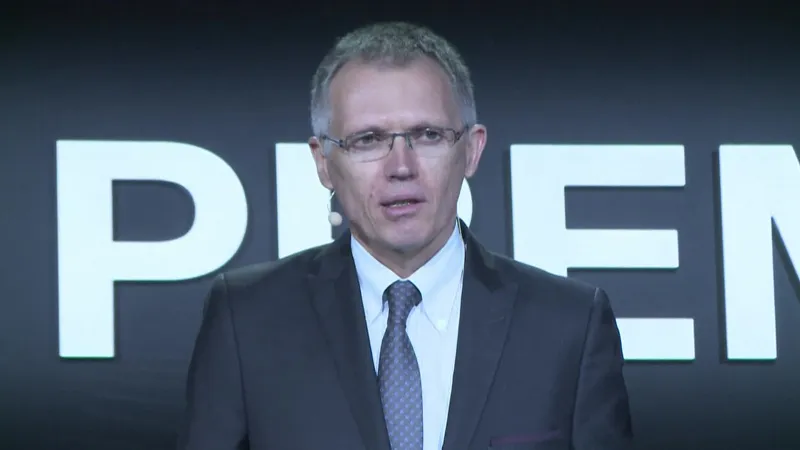/regions/2024/10/15/tavares-670e811c0e2fd230078136.jpg)
After the comments of Stellantis CEO Carlos Tavares indicating that factory closures were not excluded in his group, there does not seem to be any concern in Moselle. Since 2019, the two factories in Trémery and Metz-Borny have played the card of gradual conversion to electric but still produce engines and gearboxes for thermal vehicles.
The essentials of the day: our exclusive selection
Every day, our editorial team reserves the best regional news for you. A selection just for you, to stay in touch with your regions.
France Télévisions uses your email address to send you the newsletter “The essentials of the day: our exclusive selection”. You can unsubscribe at any time via the link at the bottom of this newsletter. Our privacy policy
It’s a little sentence from Stellantis boss Carlos Tavares that has not gone unnoticed. In everyday economic life Les Echos on Sunday October 13, he declared that he could not rule out factory closures within his group. “Closing borders to Chinese products is a trap. The Chinese will get around the barriers by investing in factories in Europe.” And the Stellantis manager added: “If the Chinese take 10% market share in Europe, that means they will produce 1.5 million cars. That represents seven assembly plants. European manufacturers will then have to either close them or transfer them to the Chinese.”
If the Chinese take 10% market share in Europe. That’s seven assembly plants. European manufacturers will then have to either close them or transfer them to the Chinese
Carlos Tavares, CEO of Stellantis
Interviewed by France 2 at the Paris Motor Show 24 hours later, Carlos Tavares confirmed that factory closures were among the possible options: “Today, nothing is excluded. There is no taboo. We must in any case ensure the sustainability of the company. We will make the necessary adjustments with humanity but with the understanding that the sustainability of the company requires adaptation to a new reality.
/regions/2024/10/15/tavares-670e811c0e2fd230078136.jpg)
Carlos Tavares, CEO of the Stellantis group. • © DR
A new reality which is the consequence of customs duties applied to electric vehicles from China, which could be taxed up to 45%.
In Moselle, we are not very worried because we are already in the process of reconversion and we make products that are long-lasting.
Philippe Pétry, CFDT on the Stellantis site in Metz-Borny
In a gloomy context for the automobile sector, with a collapse in sales at the start of the 2024 school year, and in particular the fall in registrations of electric vehicles, Carlos Tavares’ declaration should have ignited the powder on the union side. But strangely, this is not the case. Thus, in Moselle, we heard the words of Carlos Tavares but it did not arouse any emotion. As evidenced by the reaction of Philippe Pétry of the CFDT on the Stellantis site in Metz-Borny: “The fact that Carlos Tavares says today that he does not rule out closing sites does not surprise me. Why? Because we merged with Fiat a few years ago, while he reorganized the factories, looked at how things worked, and today, he realized the overproduction we could have. the temperature, we agree. We are worried for the group as a whole, for the other colleagues. Now, in Moselle we are not very worried because we are already in the process of reconversion and we are making products. which are long-term.”
Since 2019, the two Moselle sites of Metz-Borny and Trémery have started the shift towards ecological conversion with subsidiaries dedicated to electric motorization. In Metz-Borny, around 1,300 employees produce gearboxes, around half of whom work for the E-Transmission joint venture. On the Trémery side, 2,700 employees manufacture thermal engines (petrol and diesel) and electric engines through the subsidiary E-Motors which employs just over 500 people. The current problem is the factory schedule which changes from week to week, depending on vehicle sales.
“We had to do more and more electric, but we can see that it’s starting to slow down” explains Philippe Pétry “because as soon as government aid drops, sales also drop. As a result, we’re doing less, we’re doing more thermal, we are even making diesel again, even though we said that diesel was dead.”
On the CGT side, even if we are less pessimistic than a few months ago when we feared very significant losses in terms of jobs, we remain very vigilant. “The energy transition must in no case be a pretext to block our salaries, destroy jobs and empty our factories,” according to Yann Mondragon deputy secretary of the CGT in Metz-Trémery. “The company has made billions in profits and those who make this wealth should not be worried about job losses.”
Remember that with 4,000 to 4,500 employees (including temporary workers) working in Moselle, the Stellantis group is the department’s leading private employer.
Every day, receive news from your region by newsletter.
Ignore
register
Every day, receive news from your region by newsletter.
choose a region
Your email address
validate your registration
France Télévisions uses your email address to send you the newsletter for your region. You can unsubscribe at any time via the link at the bottom of these newsletters. Our privacy policy
